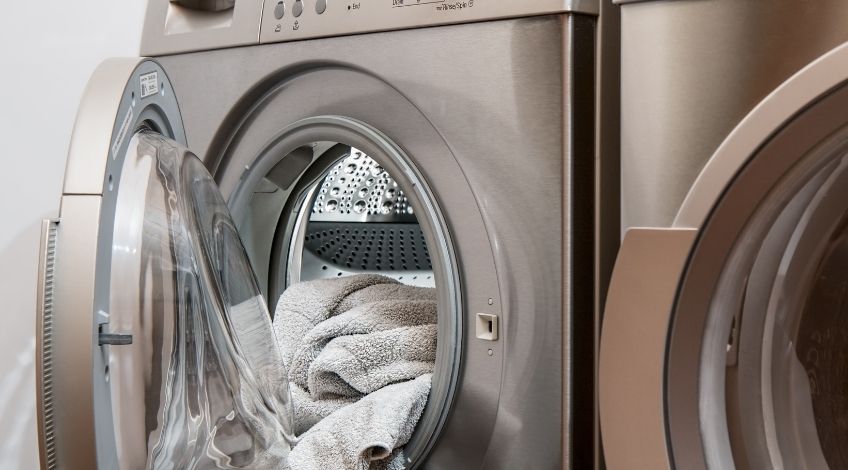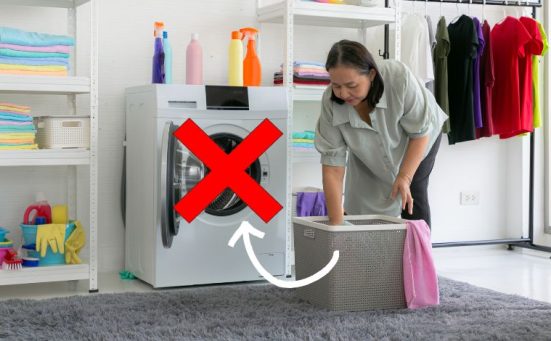
Washing Machine Trips Electric Fuse Board, Breaker or RCD? (here’s why)
If your washing machine has tripped the electric fuse board, breaker or RCD (Residual Current Device) You should call in an expert unless you are confident in your abilities and have a specialised insulation test kit. But there are a few basic tests you can do at home safely before calling in an electrician or washing machine engineer.
There are a number of reasons why a washing machine is tripping the fuse box, due to the number of components, wires and connections used to make your washing machine. Keep reading to learn how to perform a few basic checks on your machine if it keeps tripping the fuses.
Please note: Unless you are competent and confident in your abilities you should call an engineer if your washing machine keeps tripping fuses, breakers or RCDs. Remember electricity can be dangerous and can kill. If in any doubt, call an engineer.
What Are The Most Common Causes For Fusing Electrics On Washing Machines?
There are 5 areas which are likely to be the cause of a washing machine fusing your electrics which are;
- The motor
- The heater
- The suppressor or filter
- One of many wires which could short out
- Water getting onto an electrical component
However what causes that part to trip the RCD, breaker or fuse is another matter. The most common reason is when the machine has an earth leakage or dead short. This would usually happen every time you turn the machine on.
With some machines, it could be that they only trip out when certain functions are being used. Many modern washing machines will show an error code which points to the faulty component. This makes it quite an easy task to correct this issue, however, there are some faults which are more difficult to detect and for those, you’ll need some basic electrical knowhow and a test meter.
Climatic Conditions
If your washing machine is kept in a cold, damp room like a garage, outdoor building, shed or conservatory it is more likely to trip the fuse. As you know, electricity and water don’t mix and the damp air from the outbuilding can get into the appliance.
Especially the components which have low voltages, although the dampness could also affect main voltage components like the control module or motor. This can occur when the machine is first turned on or anywhere during the wash cycle. Modern washing machines are designed to be used at normal room temperature and indoors.
That doesn’t mean that hot, humid conditions can’t cause the same problems. You need to think of your washing machine as a tender plant that has to be kept in just the right temperate zone to thrive.

When Does The Fuse Trip?
Understanding what is causing the fuse to trip is a big part in how to fix your washing machine. So the engineer will need to know exactly when the machine causes the RCD, breaker or fuse to trip.
Fuse Trips As Soon As The Machine Is Turned On
In the first instance, you need to check that the plug wiring and cables are connected correctly and undamaged. Inspect the plug and cable for any burn marks or damage. Then you need to check the actual socket the machine is plugged into, is it damaged?
Then carefully try another electrical item in that same socket to determine whether the socket is the cause of the problem. Then check the terminal block for scorch marks, these tend to become problematic especially in older machines as they can degrade with age.
Fuse Trips When The Door Locks Or As Soon As A Dial Is Turned
In some cases, all that you need to do is turn the dial to switch the machine on and the fuse will trip. This can be caused due to any number of components failing when the neutral and live are in one place.
Then there’s the safety lock on the machine door, this could be arcing or causing an electrical fault which could lead to the RCD or fuse tripping.
Fuse Trips As Soon As A Program Starts
This will usually be caused by a faulty component which is energised once power gets to them. Components like;
- The motor
There are 2 types of motors fitted to washing machines; brushless motors and motors with carbon brushes. The carbon brushes can wear out over time. With brushless motors, it’s usually the capacitor or motor circuit board which is the issue. - The heating element
This is a common cause of washing machine electrical problems. The heating element is submerged in water and can earth out if it’s damaged. It could also be the wiring which connects to the element which can be faulty. - The door lock
The door lock can develop a fault and burn out which can then cause a short. - The water inlet valve
It is possible for the water inlet valve to short out but as they are coated in plastic, this is rare. - The mains filter (interference suppressor)
You’ll find this where the main electrical cable comes into the washing machine. - The start/stop switch
If the start/stop switch gets a short circuit, it is usually due to the connectors overheating. Other signs include, the switch stops working and the start button becomes stuck. - The drain pump
The drain pump could leak or have water leaked onto its coil which could cause it to short. - The printed circuit board
The printed circuit board could burn out and cause a short, but in most cases this would be visible and easy to spot. - The wiring loom
The concrete blocks on the washing machine can chafe against the wiring loom and cause the wires to short out.
These will all need to be tested using a PAT tester to see which one is at fault. That component will then need to be replaced.
The Fuse Trips When The Spin Cycle Starts
In many cases the washing machine starts running fine, and completes the wash cycle but then trips the breaker, fuse or RCD when the spin cycle begins.
This could be caused by a damaged capacitor which can’t draw enough power to start the motor. This normally trips the fuse on the spin cycle because the capacitor cannot perform its main function.
Other Causes
We’ve now covered the many internal reasons why a washing machine might trip the fuse, breaker or RCD. Let’s look at any other reasons which could cause the same fault.
Overloaded Circuit
If you are running too many appliances off the same circuit at the same time, it could cause the circuit to trip. For example, running the washing machine and tumble dryer through the same fuse circuit would create a demand for power that exceeds the amperage of that circuit.
Using An Extension Cable
Washing machines need to be plugged directly into a socket. Many extension cables don’t have the capacity to run large appliances like washing machines. There is a strong possibility of short circuiting or even the risk of fire if an extension cable is used with a washing machine.
The Washing Machine Has A Leak
If your washing machine has a leak, it is likely to trip the fuse, RCD or breaker at some point. If this happens, you could dismantle the machine and look for water traces or call in an expert.
Clues To What Part Is Faulty
Fixing this type of problem on a washing machine becomes a lot like detective work. We find ourselves looking for clues as to what part is likely to be faulty. For instance;
- If the fuse trips after the machine has begun filling with water and the drum starts to spin; It could be a fault with the motor.
- If it trips straight after filling with water and after the drum has been turning; It could be a fault with the heating element.
- If it only trips on the spin cycle; It could be a faulty capacitor, or a bare wire which only shorts when the machine is causing the drum to bounce around, this could only happen every now and then and not on every wash program.
- If the door won’t open; It could be that the fault lies with the door lock mechanism.
These suggestions are intentionally vague, because the reality is it could be any number of things. This is why we recommend calling in an expert who will be able to diagnose the fault and replace the part safely and in the shortest amount of time possible.
Frequently Asked Questions
If your washing machine is tripping your RCD it is usually an earth leakage issue or a dead short. This will usually occur every time you try to use your machine.
There are a number of reasons which could cause a washing machine to trip a circuit breaker including; A faulty motor, faulty heating element, faulty mains filter (suppressor), a bare wire or even a water leak inside the machine.
A washing machine should be on a 20 amp circuit.
Also, follow us on Pinterest ...



